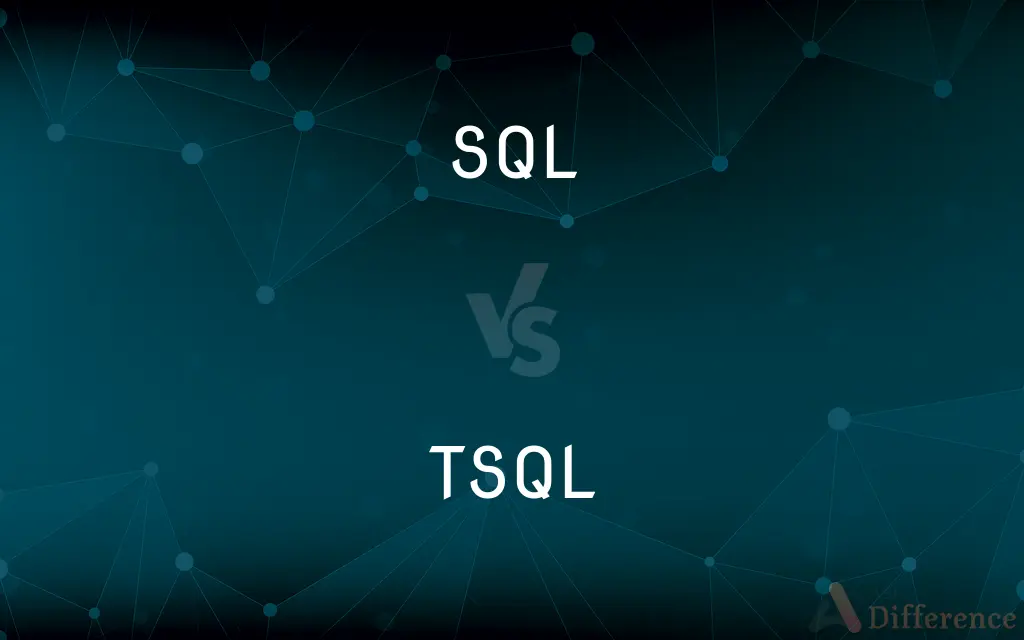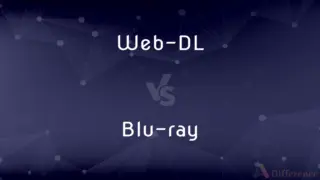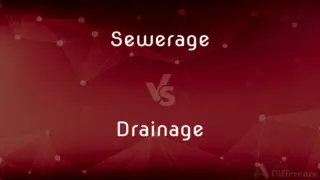SQL vs. TSQL — What's the Difference?
By Tayyaba Rehman & Fiza Rafique — Published on February 27, 2024
SQL is a standard language for accessing and manipulating databases, while TSQL (Transact-SQL) is an extension by Microsoft adding procedural programming and local variables. TSQL specifically enhances SQL with additional features for SQL Server.

Difference Between SQL and TSQL
Table of Contents
ADVERTISEMENT
Key Differences
SQL, standing for Structured Query Language, is the foundational language used for managing and manipulating relational databases. It enables users to create, read, update, and delete database records. SQL is standardized and used across various database systems, ensuring broad compatibility and a unified approach to database management.
TSQL, or Transact-SQL, is an extension of SQL created by Microsoft for use with its SQL Server database. It introduces additional features such as transaction control, exception and error handling, and row processing. TSQL allows users to write more complex and powerful queries by incorporating procedural programming elements that are not available in standard SQL.
One key difference lies in the procedural extensions TSQL offers, such as local variables, and the ability to write scripts that include complex logical operations. This enables SQL Server users to execute more sophisticated tasks directly within the database, enhancing efficiency and capability.
TSQL also includes unique built-in functions and system stored procedures that extend the functionality of SQL. These additions make TSQL a more powerful tool for SQL Server database administration and development, providing capabilities like dynamic execution of SQL statements and direct access to server administration and maintenance features.
Another aspect where TSQL differentiates itself is in its transaction control. TSQL has a more robust implementation of transaction management, allowing for finer control over commit and rollback operations. This is crucial for maintaining data integrity and consistency in complex database operations.
ADVERTISEMENT
Comparison Chart
Definition
A standardized language for managing relational databases.
An extension of SQL specific to Microsoft SQL Server, adding procedural programming features.
Compatibility
Broad compatibility across various relational database management systems.
Specific to Microsoft SQL Server.
Procedural Extensions
Does not include procedural programming or local variables.
Supports procedural programming, local variables, and control-of-flow statements.
Transaction Control
Standard transaction control features.
Enhanced transaction control with advanced features for error handling and complex transactions.
Unique Features
Lacks TSQL-specific features like built-in functions and procedures.
Includes unique built-in functions, system stored procedures, and the ability to execute batches of SQL statements.
Compare with Definitions
SQL
SQL manages database permissions.
GRANT SELECT ON users TO public.
TSQL
TSQL enables dynamic SQL execution.
EXEC sp_executesql N'SELECT * FROM users WHERE id = @UserID', N'@UserID INT', @UserID.
SQL
SQL enables the creation of database structures
CREATE TABLE users (id INT, name VARCHAR).
TSQL
It includes error handling.
BEGIN TRY...END TRY BEGIN CATCH...END CATCH.
SQL
SQL can modify data.
UPDATE users SET name = 'John' WHERE id = 1.
TSQL
TSQL introduces variables.
DECLARE @UserID INT = 1.
SQL
It allows for querying data.
SELECT * FROM users.
TSQL
TSQL supports transactions.
BEGIN TRANSACTION; UPDATE users SET name = 'John' WHERE id = @UserID; COMMIT;
SQL
It supports deleting records.
DELETE FROM users WHERE id = 1.
TSQL
It allows for procedural logic.
IF @UserID > 0 BEGIN SELECT * FROM users END.
Common Curiosities
What is SQL?
SQL is a standardized language for managing and manipulating relational databases.
Can TSQL be used with databases other than SQL Server?
No, TSQL is designed specifically for Microsoft SQL Server.
How do SQL and TSQL handle transactions?
Both support transactions, but TSQL provides more advanced features for managing them.
What makes TSQL unique compared to SQL?
TSQL's unique procedural extensions, local variables, and specific functions and procedures for SQL Server.
What are some key features of TSQL?
Key features include procedural programming, local variables, error handling, and transaction control.
What is TSQL?
TSQL is a Microsoft extension to SQL adding procedural programming and local variables, specific to SQL Server.
Can SQL perform procedural programming?
No, standard SQL does not support procedural programming; this is a feature of TSQL.
What are the benefits of using TSQL?
Benefits include enhanced data manipulation, procedural programming, and robust transaction control.
Is SQL standardized?
Yes, SQL is a standardized language used across various database systems.
Can TSQL queries run on non-SQL Server databases?
No, TSQL queries are specific to SQL Server and cannot be directly run on other databases.
Can I use TSQL for database design?
Yes, TSQL can be used for database design, especially for defining complex logic within SQL Server.
Do I need to learn SQL before TSQL?
Yes, understanding SQL is foundational before moving on to TSQL's advanced features.
Are SQL and TSQL the same?
No, SQL is the base language for database management, while TSQL is an extension for SQL Server.
How does error handling differ between SQL and TSQL?
TSQL provides comprehensive error handling capabilities through TRY...CATCH blocks, unlike standard SQL.
What is the main reason to use TSQL over SQL?
The main reason is to utilize the advanced features provided by TSQL for SQL Server database management and development.
Share Your Discovery

Previous Comparison
Web-DL vs. Blu-ray
Next Comparison
Sewerage vs. DrainageAuthor Spotlight
Written by
Tayyaba RehmanTayyaba Rehman is a distinguished writer, currently serving as a primary contributor to askdifference.com. As a researcher in semantics and etymology, Tayyaba's passion for the complexity of languages and their distinctions has found a perfect home on the platform. Tayyaba delves into the intricacies of language, distinguishing between commonly confused words and phrases, thereby providing clarity for readers worldwide.
Co-written by
Fiza RafiqueFiza Rafique is a skilled content writer at AskDifference.com, where she meticulously refines and enhances written pieces. Drawing from her vast editorial expertise, Fiza ensures clarity, accuracy, and precision in every article. Passionate about language, she continually seeks to elevate the quality of content for readers worldwide.











































